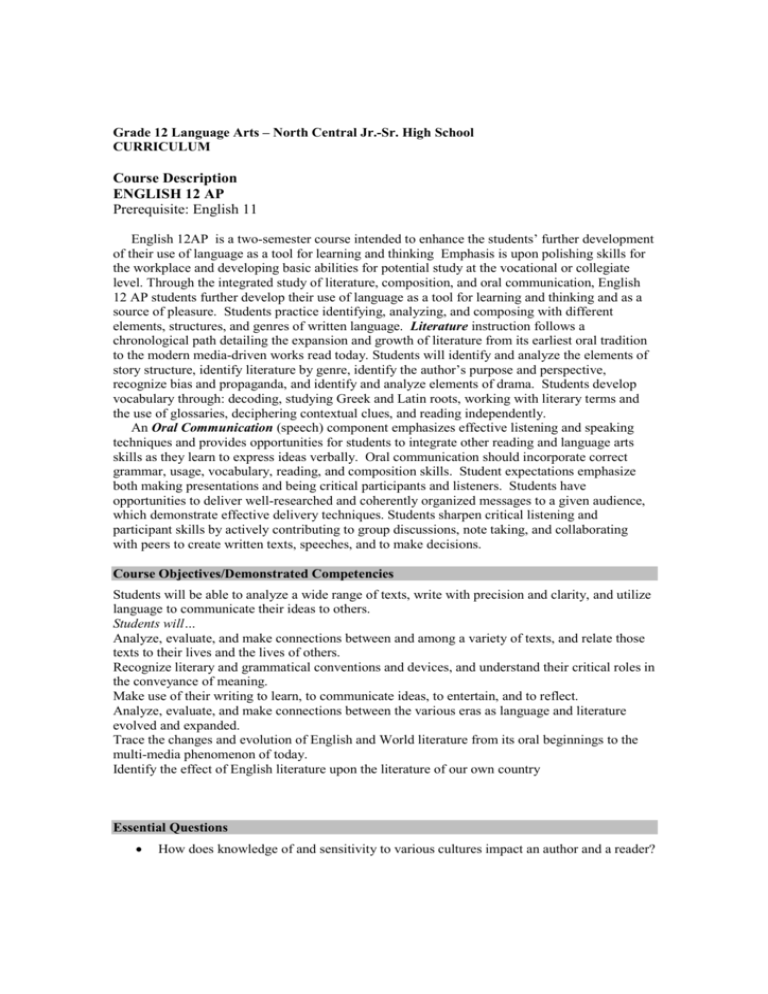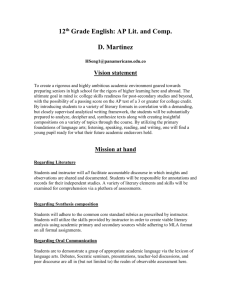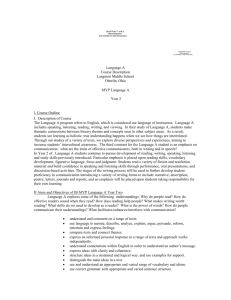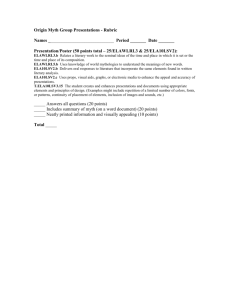Course Description ENGLISH 12 AP Prerequisite: English 11
advertisement

Grade 12 Language Arts – North Central Jr.-Sr. High School CURRICULUM Course Description ENGLISH 12 AP Prerequisite: English 11 English 12AP is a two-semester course intended to enhance the students’ further development of their use of language as a tool for learning and thinking Emphasis is upon polishing skills for the workplace and developing basic abilities for potential study at the vocational or collegiate level. Through the integrated study of literature, composition, and oral communication, English 12 AP students further develop their use of language as a tool for learning and thinking and as a source of pleasure. Students practice identifying, analyzing, and composing with different elements, structures, and genres of written language. Literature instruction follows a chronological path detailing the expansion and growth of literature from its earliest oral tradition to the modern media-driven works read today. Students will identify and analyze the elements of story structure, identify literature by genre, identify the author’s purpose and perspective, recognize bias and propaganda, and identify and analyze elements of drama. Students develop vocabulary through: decoding, studying Greek and Latin roots, working with literary terms and the use of glossaries, deciphering contextual clues, and reading independently. An Oral Communication (speech) component emphasizes effective listening and speaking techniques and provides opportunities for students to integrate other reading and language arts skills as they learn to express ideas verbally. Oral communication should incorporate correct grammar, usage, vocabulary, reading, and composition skills. Student expectations emphasize both making presentations and being critical participants and listeners. Students have opportunities to deliver well-researched and coherently organized messages to a given audience, which demonstrate effective delivery techniques. Students sharpen critical listening and participant skills by actively contributing to group discussions, note taking, and collaborating with peers to create written texts, speeches, and to make decisions. Course Objectives/Demonstrated Competencies Students will be able to analyze a wide range of texts, write with precision and clarity, and utilize language to communicate their ideas to others. Students will… Analyze, evaluate, and make connections between and among a variety of texts, and relate those texts to their lives and the lives of others. Recognize literary and grammatical conventions and devices, and understand their critical roles in the conveyance of meaning. Make use of their writing to learn, to communicate ideas, to entertain, and to reflect. Analyze, evaluate, and make connections between the various eras as language and literature evolved and expanded. Trace the changes and evolution of English and World literature from its oral beginnings to the multi-media phenomenon of today. Identify the effect of English literature upon the literature of our own country Essential Questions How does knowledge of and sensitivity to various cultures impact an author and a reader? English 12 AP Curriculum Page 2 How does an understanding of advanced literary devices, grammar, and vocabulary enhance one’s appreciation for and understanding of a text? How has literature been affected by the role historical events play?? How does one facilitate the advanced literary devices, grammar, and vocabulary to improve one’s written and oral communication? What are the hallmarks of effective oral presentations? What is required for effective collaboration in regard to learning, writing and presenting? How does research broaden one’s perspective on a given text? How does one’s thoughtful speaking and listening contribute to one’s critical stance concerning a text? What are the defining characteristics of various genres ? What are the appropriate methods of literary analysis especially in regard to universal literary themes ? What are the methods used in characterization ? Indiana State Standards The standards describe a connected body of linguistic understandings and competencies and are a comprehensive foundation that all students should learn. They describe the knowledge and skills that students should acquire from kindergarten through high school. Standard 1: READING: Word Recognition, Fluency, and Vocabulary Development .Students apply their knowledge of word origins (words from other languages or from history or literature) to determine the meaning of new words encountered in reading and use those words accurately. Standard 2: READING: Comprehension and Analysis of Nonfiction and Informational Text * Students read and understand grade-level appropriate material. At Grade 12, in addition to regular classroom reading, students read a wide variety of nonfiction, such as biographies, autobiographies, books in many different subject areas, essays, speeches, magazines, newspapers, reference materials, technical documents, and online information. Standard 3: READING: Comprehension and Analysis of Literary Text * Students read and respond to grade-level appropriate historically or culturally significant works of literature. At Grade 12, students read a a wide variety of fiction, such as classic and contemporary literature, historical fiction, fantasy, science fiction, folklore, mythology, poetry, short stories, and dramas. Standard 4: WRITING: Processes and Features Students write coherent and focused texts that show a well-defined point of view and tightly reasoned argument. The writing demonstrates students’ progression through the stages of the writing process ( prewriting, writing, editing, and revising ). Standard 5: WRITING: Applications (Different Types of Writing and Their Characteristics) At Grade 12, students continue to combine the rhetorical strategies of narration, exposition, persuasion, and description; to produce reflective compositions, historical investigation reports, and job applications and resumes; and to deliver multimedia presentations. Student writing demonstrates a command of Standard English and the research, organizational, and drafting strategies outlined in Standard 4 – Writing Processes and features. Writing demonstrates an awareness of the audience (intended reader) and purpose for writing. English 12 AP Curriculum Page 3 Standard 6: WRITING: English Language Conventions Students write using Standard English conventions. Standard 7: LISTENING AND SPEAKING: Skills, Strategies, and Applications Students formulate thoughtful judgments about oral communication. They deliver focused and coherent presentations that convey clear and distinct perspectives and demonstrate solid reasoning. Students deliver polished formal and extemporaneous presentations that combine traditional speech strategies of narration, persuasion, and description. They use gestures, tone, and vocabulary appropriate to the audience and purpose. Students use the same Standard English conventions for oral speech that they use in their writing. Standard LITERATURE 1: Vocabulary and Concept Development Students apply their knowledge of word origins (except words from other languages, from history or literature, and from other fields) to determine the meanings of new words encountered in reading and use those words accurately. Standard LITERATURE 2: Analysis and Critique of Nonfiction * Students read and understand grade-level appropriate material. Students read a variety of nonfiction. These include: biographies, autobiographies, books in many different subject areas, essays, speeches, magazines, newspapers, reference materials, technical documents, and online information. Standard LITERATURE 3: Literary Analysis and Criticism of Fiction * Students read and respond to grade-level appropriate historically or culturally significant works of literature. Such literature includes: classic and contemporary literature, historical fiction, fantasy, science fiction, folklore, mythology, poetry, short stories, and dramas. Standard COMPOSITION 1: Process Students write coherent and focused texts that show a well-defined point of view and a tightly reasoned argument. The writing demonstrates students’ progression through the stages of the writing process (prewriting, writing, editing, reviewing, and publishing). Standard COMPOSITION 2: Applications Students continue to combine the rhetorical strategies of narration, exposition, persuasion, and description in texts. Students are introduced to writing reflective compositions and historical investigation reports and become familiar with the forms of job applications and resumes. Students deliver multi-media presentations on varied topics. Student writing demonstrates a command of Standard English and the research, organizational, and drafting strategies outlined in Standard 4 – Writing Process. Writing demonstrates an awareness of the audience (intended reader) and purpose for writing. Standard COMPOSITION 3: English language Conventions Students write using Standard English conventions. * Selections in the www.doe.in./gov/standards/readinglist.html illustrate the quality and complexity of the materials to be read by students. English 12 AP Curriculum Page 4 Areas of Instruction Short Stories to develop The Literary Analysis Comparison and Contrast Epic poetry Beowulf Electronic Publishing /Power Point Oral Presentations Novel Unit – Jane Eyre A Tale of Two Cities Poetry and creative writing – Prologue to the Canterbury Tales Elizabethan sonnets Restoration poetry (theme of Carpe Diem) Romantic poetry (Wordsworth and Coleridge Nonfiction – diaries (Pepys) and journals (Defoe) and essays (Donne and Swift) Drama – Macbeth Pygmalion Modern short stories (Orwell) Practical exercises in vocabulary development through literature and supplements Course Assessments Participation in class discussions, note taking, and daily activities Group and Individual Projects and Oral Presentations Quizzes and Tests covering readings and vocabulary Electronic Evaluations and Participation Essays, analyses, and reviews Mid-term and Final Exams Course Syllabus (Units will be arranged by the instructor to accommodate the school and department calendars. ) Week One: Students will: Introduce the Anglo-Saxon Era of Writing and Oral Tradition Review Writing strategies for analyses and Weeks Two and Three: Students will: Read and Test Beowulf Study vocabulary utilizing the literature and supplemental materials Write an essay analyzing the main characters of Beowulf Weeks Four and Five. Students will: Read and study the Prologue to the Canterbury Tales Read, analyze, and discuss some of Chaucer’s tales Analyze characters from the Prologue English 12 AP Curriculum Page 5 Write a character analysis from Chaucer Study information concerning the Renaissance and Medieval Ages Prepare expository essay for incoming freshmen (due at mid-term) Weeks Six and Seven. Students will: Study the Elizabethan structure focusing on Rhyme scheme, meter, and rhythm Continue vocabulary studies from literature Read various speeches and essays from renaissance writers Weeks Eight and Nine. Students will Read and study Macbeth analyze historical significance of the Renaissance(Elizabethan) time period identify rhetorical devices especially in historically significant speeches interpret informational concepts analyze author’s or character’s perspectives Midterm test of areas covered Finalize freshmen essay Week Ten. Students will Study materials relevant to the Restoration Period View video Fire and Fever Read excerpts from Pepys and Defoe Analyze the relevance of diaries and journals Study satirical works of Swift ( A Modest Proposal) Study vocabulary materials from literature and supplemental materials Begin preparation of narrative Week Eleven and Twelve. Students will Read teacher selected material from Restoration poets Discuss/analyze poetry Discuss “Carpe Diem” theme in poetry View video “Dead Poets’ Society Write their own original poem for presentation to the class Week Thirteen Students will Study and analyze material from the Romantic Age Read/Analyze/test the poem “Rime of the Ancient Mariner” by Coleridge Read/analyze/test various Romantic poems as selected by the teacher Week Fourteen. Students will + Review/discuss the historical influence of the Victorian Age English 12 AP Curriculum Page 6 + + View video concerning the life of Charles Dickens Begin reading the novel A Tale of Two Cities Weeks Fifteen, Sixteen, Seventeen, and Eighteen. Students will + Finish reading, analyze, and test the novel + Complete a narrative essay concerning an event relative to time in high school + Complete assignments in reviewing usage of Standard English + Study and test vocabulary lessons from literary and supplemental sources. + Prepare for Semester Final Test Course Materials: Text, Novels, and Films Key Text and Novels: Prentice – Hall Literature: The British Tradition Novel – A Tale of Two Cities Glencoe (optional novel) Jane Eyre – McDougall - Littell Various supplemental references and textbooks Commercial Films and Videos: Beowulf, Paramount Pictures, 2007 A Prologue to Chaucer, Glencoe Literature Library Macbeth (Play), Glencoe Literature library Fire and Fever, Glencoe Literature Library Dead Poet’s Society, Touchstone Home Video (optional) Pride and Prejudice, Warner Brothers, 1940 Biogeraphy: Charles Dickens, Glencoe Literature Library and Biography Channel * Parents should contact the teacher or department chair to discuss concerns with texts. If required, the teacher will provide a substitute text of comparable length that approximates the stated academic purpose. Selected essays, short stories, poems, and articles will be used to teachers to augment major units.








